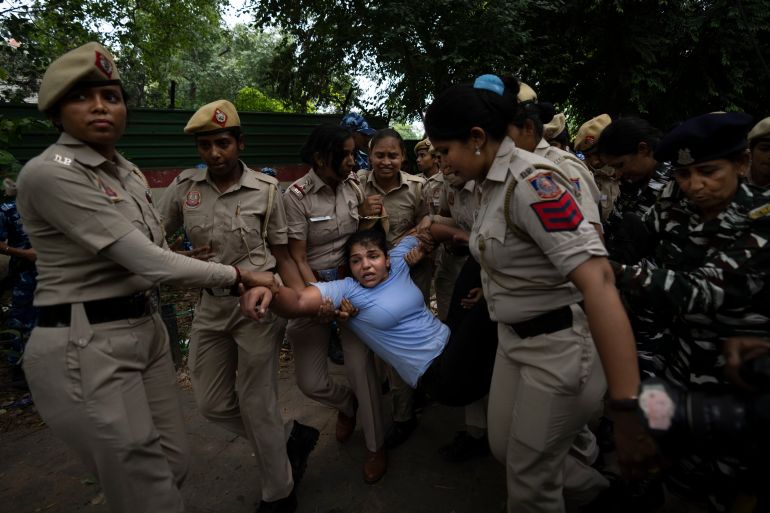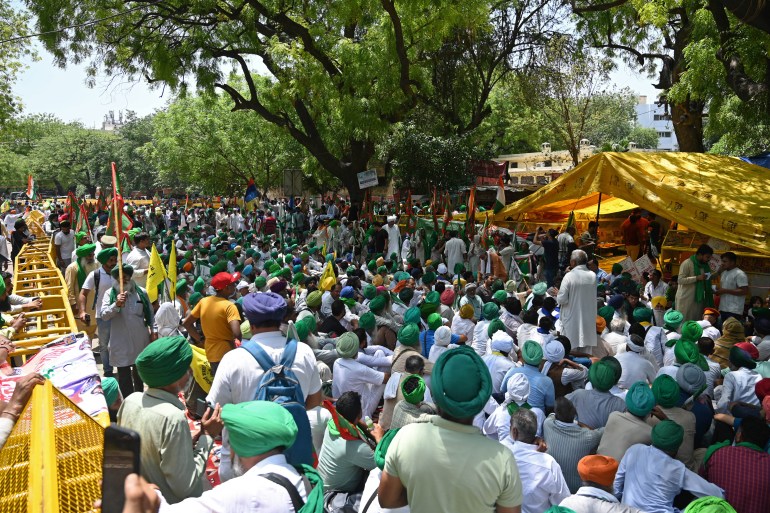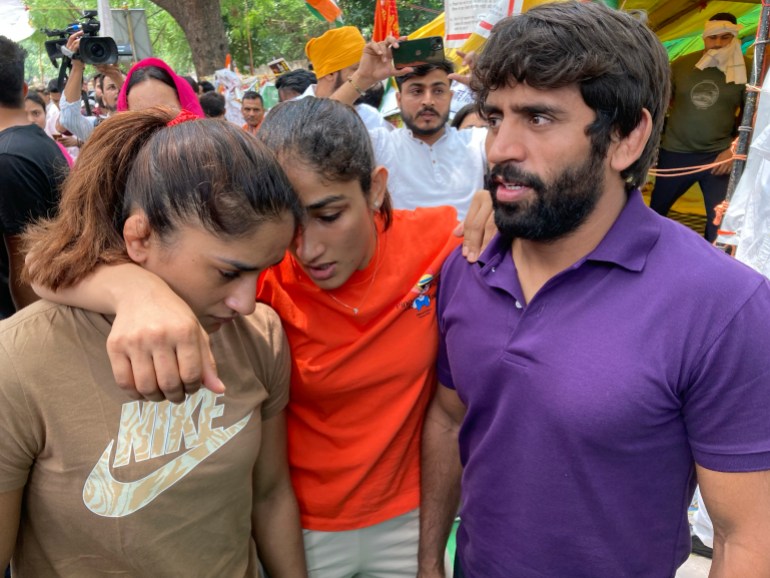‘Dictatorship’: Protesting Indian wrestlers charged with rioting
Olympic medallists question police inaction against ruling party MP accused of sexual harassment by female wrestlers.

Several top Indian wrestlers, including Olympic medallists Sakshi Malik and Bajrang Punia, have been charged with rioting and disorder by police in New Delhi after their arrests during a march to the new parliament building following its inauguration by Prime Minister Narendra Modi.
The wrestlers and their supporters were arrested on Sunday after scuffles broke out in front of parliament as they intensified their protests demanding the arrest of their federation chief over sexual harassment allegations.
Keep reading
list of 3 itemsIndian farmers break down barricades to join protesting wrestlers
Hockey Canada CEO, board step down over handling of sexual abuse
Police released some of the protesters late on Sunday but filed first information reports (FIR), or formal complaints, against others under multiple articles of the Indian Penal Code, ranging from rioting to “causing an obstruction in the duty of a public servant with the use of assault and criminal force”.
The wrestlers have been protesting in the capital for more than a month over the lack of action against Brijbhushan Sharan Singh, a member of parliament belonging to Modi’s ruling Bharatiya Janata Party.
The protesting athletes have demanded his “immediate arrest” and sought the intervention of the Supreme Court, which directed the police to register a case against the 66-year-old. The MP has been accused of harassing several female athletes while leading the Wrestling Federation of India (WFI). He has denied all the allegations.
Malik, who has been at the forefront of the protests, questioned the police’s swift action to detain those who were protesting “peacefully”.
“It took seven days for the Delhi Police to register an FIR against sexual harasser Brij Bhushan, and it didn’t even take seven hours to register an FIR against us for peacefully protesting,” she tweeted. “Is this country under dictatorship? The whole world is watching how the government is treating its players.”
दिल्ली पुलिस को यौन शोषण करने वाले बृज भूषण के ख़िलाफ़ FIR दर्ज करने में 7 दिन लगते हैं और शांतिपूर्ण आंदोलन करने पर हमारे ख़िलाफ़ FIR दर्ज करने में 7 घंटे भी नहीं लगाए। क्या इस देश में तानाशाही शुरू हो गई है ? सारी दुनिया देख रही है कैसे सरकार अपने खिलाड़ियों के साथ कैसा बर्ताव… https://t.co/h0TEXY0x92
— Sakshee Malikkh (@SakshiMalik) May 28, 2023
Speaking during their rally, Punia said, “This is a fight for the respect of our daughters and sisters.”
“We are asking for justice,” he said.
On Monday, Punia responded to a former Indian Police Service officer’s tweet calling for the protesters to be shot.
“An IPS officer is talking about shooting us,” he tweeted. “Brother, we are standing in front of you, tell us where to come to get shot… I swear that I will not show my back, I will take your bullet in my chest.”
ये IPS ऑफिसर हमें गोली मारने की बात कर रहा है। भाई सामने खड़े हैं, बता कहाँ आना है गोली खाने… क़सम है पीठ नहीं दिखाएँगे, सीने पे खाएँगे तेरी गोली। यो ही रह गया है अब हमारे साथ करना तो यो भी सही। https://t.co/jgZofGj5QC
— Bajrang Punia 🇮🇳 (@BajrangPunia) May 29, 2023
The use of police force and criminal charges against the protesting athletes has drawn condemnation from India’s Olympic gold medallist javelin thrower Neeraj Chopra, who said, “There has to be a better way to deal with this.” Chopra won the gold in the 2020 Tokyo Olympics.
यह देखकर मुझे बहुत दुख हो रहा है | There has to be a better way to deal with this. https://t.co/M2gzso4qjX
— Neeraj Chopra (@Neeraj_chopra1) May 28, 2023
Protest during parliament inauguration
The wrestlers tried to march to India’s new parliament building as Modi was inaugurating it, but they were stopped by hundreds of police officers. Among those detained and hauled away in buses were Olympic bronze medallists Malik and Punia.
Ahead of her detention, Malik told protesters that democracy was under threat. “On the one hand, parliament is being inaugurated, and on the other hand, democracy is being murdered. So this is absolutely intolerable,” she said.
The two wrestlers are national heroes in a country that has long yearned for mostly elusive Olympic success. Modi congratulated them when Malik won her medal in 2016 in Rio de Janeiro and Punia won his at the 2020 Tokyo Games.
Now the wrestlers are accusing the Modi government of ignoring complaints that are embarrassing for the prime minister, who has portrayed himself as a champion of women’s rights. But the Delhi Police defended the arrests.
“They broke the barricades and didn’t follow police directions,” senior officer Dependra Pathak told local media. “They broke the law, and that’s why they were detained.”
Malik, who medalled in the women’s 58kg freestyle event, shared photos and video of the wrestlers being dragged away by police.
“This is how our champions are being treated. The world is watching us,” she tweeted
This is how our champions are being treated. The world is watching us! #WrestlersProtest pic.twitter.com/rjrZvgAlSO
— Sakshee Malikkh (@SakshiMalik) May 28, 2023
Security in the capital was tightened ahead of the parliament’s inauguration, and personnel also stood guard on the outskirts of Delhi as a group of farmers tried to enter the city to support the protesting wrestlers.
This month, dozens of farmers broke down police barricades in the city to join the protest.

‘This is the culture’
Olympian Vinesh Phogat, one of the athletes leading the protests, told Al Jazeera that several sexual harassment cases have been reported in the past, but Singh succeeded in either making the charges disappear or made sure the complainant did not compete again.
Recently, Phogat said, she received a phone call from young female wrestlers from a state in eastern India. “They had complained to the WFI in writing about sexual harassment by a coach,” she said. “The coach was banned for 10 days but returned in seven days as head coach. This is the culture [of the WFI]. When the head himself is like that, what action will he take against others?”
The protesting wrestlers have refused to share the names of the women who have complained and will not let them come forward.

‘Biggest culprits are sports officials’
Wrestling is arguably India’s most successful Olympic sport. In the 76 years since India’s independence, it has won 21 medals in individual sports, seven by wrestlers.
Most wrestlers come from villages, many of them from poor families and the bulk of them have been from Haryana, an agrarian and highly patriarchal region with high rates of female foeticide and murders of women known as “honour killings”.
Female athletes have long complained of sexual harassment in their sports although they have been reluctant to speak out publicly.
“Many athletes have told me about being subjected to various kinds of exploitation, but they don’t want to come out in the open when they are in their prime,” sports lawyer and activist Saurabh Mishra told Al Jazeera.
“Seeking favours is not rare – financial, sexual,” Mishra added. “In my view, the biggest culprits are sports federation officials who are running their fiefdoms.”